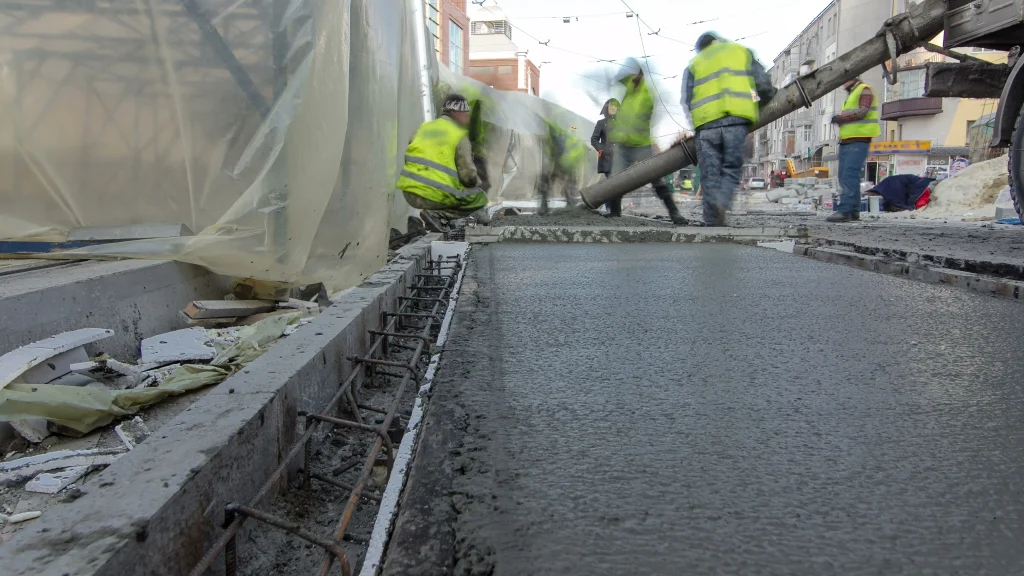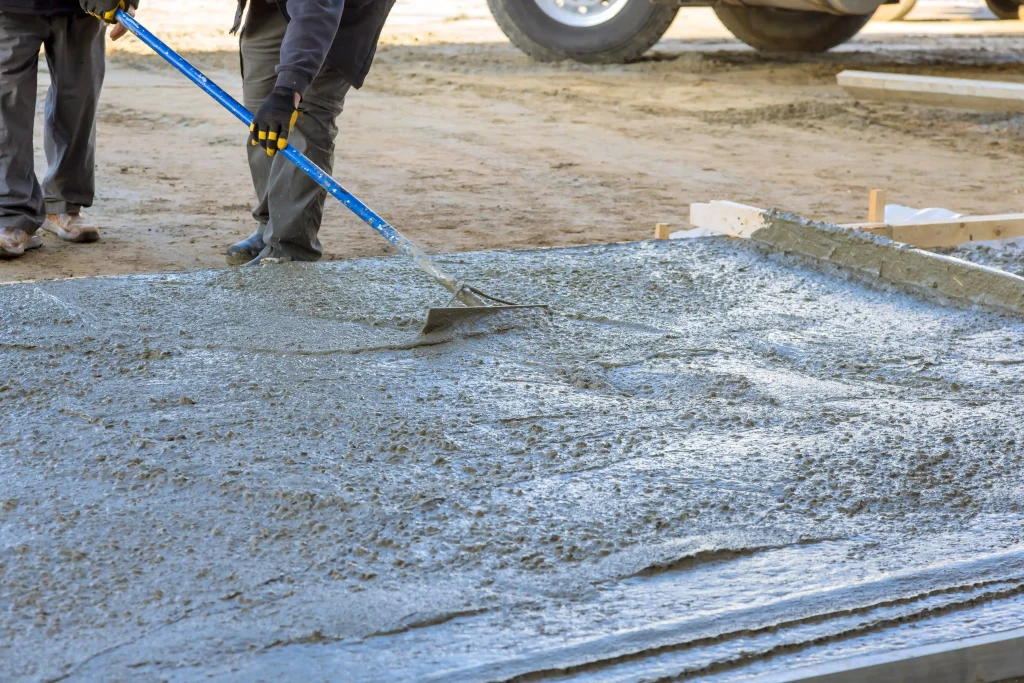Selecting the appropriate concrete grade for your construction project is crucial for ensuring structural integrity, longevity, and compliance with building regulations. Yet for many builders, developers, and homeowners, the array of concrete grades and their cryptic alphanumeric designations can seem confusing. Understanding what these grades mean and when to use each one doesn’t need to be complicated.
This comprehensive guide demystifies concrete grade strengths UK specifications, explaining the most common grades used in construction, their applications, and how to choose the right mix for your project. Whether you’re planning a domestic driveway or a commercial foundation, understanding concrete strengths ensures you specify the right material from the start.
How Concrete Grades Are Classified
In the UK, concrete grades are designated using a standardised system that indicates the material’s compressive strength. The most common classification you’ll encounter is the format “C25/30” or “C30/37”, where the “C” stands for concrete, and the two numbers represent strength measurements in Newtons per square millimetre (N/mm²).
The first number indicates the characteristic cylinder strength, whilst the second number shows the characteristic cube strength. These figures represent the minimum compressive strength the concrete will achieve after 28 days of curing under standard conditions. For practical purposes, most UK construction professionals focus on the second number—the cube strength—as this is the value typically referenced in British Standards and building regulations.
Understanding these designations helps you communicate clearly with your concrete supplier and ensures you receive exactly the right specification for your requirements. At Express Concrete, our team can guide you through the technical details and recommend the most appropriate concrete mix design London specifications for your specific application.
C10/15 and C15/20: Light-Duty Applications
At the lower end of the strength spectrum, C10/15 and C15/20 grades serve specific purposes in construction, though they’re unsuitable for structural applications.
C10/15 concrete is primarily used for non-structural applications such as mass concrete fill, temporary roadways, agricultural buildings, and lightweight shed bases. This economical option provides adequate performance where high strength isn’t required, but it should never be used for any load-bearing elements.
C15/20 concrete offers slightly higher strength and finds use in applications including garden walls and non-structural elements, blinding layers beneath foundations, pathways with minimal traffic, and drainage works. Whilst stronger than C10/15, this grade still isn’t appropriate for structural purposes or areas subject to significant loading.
These lower-grade mixes can offer cost savings for appropriate applications, but it’s essential to recognise their limitations. Using an insufficient grade for structural purposes compromises safety and violates building regulations. Express Concrete’s technical team can advise whether these lighter-duty mixes suit your project or whether a higher grade is necessary.
C20/25: General Purpose Foundation Work
C20/25 represents a versatile general-purpose grade suitable for many residential and light commercial applications. This grade provides adequate strength for numerous common construction scenarios without the additional cost of higher-specification concrete.
Typical applications for C20/25 include domestic foundations for houses and extensions, internal floor slabs with standard loading, light-duty warehouse floors, agricultural buildings requiring moderate strength, and general groundworks. This grade meets building regulations for many standard domestic projects, making it a popular choice for house builders and renovation contractors.
However, C20/25 has limitations when exposed to aggressive ground conditions or where higher loading is anticipated. Projects involving sulphate-bearing soils, commercial premises with heavy equipment, or areas subject to significant traffic may require stronger grades. Always consult structural calculations and site surveys when determining appropriate specifications.
Express Concrete supplies C20/25 mix for countless residential projects throughout London, and our team can quickly confirm whether this grade meets your specific requirements based on your project details.
Get Your Quick Quote Today
C25/30: The Most Common Structural Grade
C25/30 concrete represents the workhorse of the UK construction industry. This grade offers excellent all-round performance for the majority of structural applications in both residential and commercial projects, striking an ideal balance between strength, durability, and cost-effectiveness.
The versatility of C25/30 makes it suitable for reinforced foundations for domestic and commercial buildings, ground floor slabs in residential properties, driveways and hard standings subject to regular vehicle traffic, structural elements including beams and columns, precast concrete products, and general structural concrete work. Building regulations commonly specify C25/30 as the minimum grade for structural elements, and it’s often the default choice for projects where structural calculations don’t indicate a need for higher strength.
This grade performs reliably in normal ground conditions and provides adequate durability for most UK exposure environments. Its widespread use means it’s readily available, competitively priced, and familiar to contractors and building inspectors alike. When structural engineers specify “standard structural concrete” without further detail, they typically mean C25/30.
At Express Concrete, C25/30 concrete accounts for a significant proportion of our deliveries. We maintain consistent quality control to ensure every batch meets the specified strength requirements, and our experience with this grade means we can offer valuable advice on placement, curing, and finishing techniques to achieve optimal results.
C30/37: Heavy-Duty and Commercial Applications
When projects demand higher strength or enhanced durability, C30/37 ready mix provides the additional performance characteristics necessary for challenging applications. This grade costs more than C25/30 but delivers significantly greater compressive strength and improved resistance to environmental factors.
C30/37 excels in commercial and industrial floor slabs supporting heavy machinery, foundations subject to high loading or difficult ground conditions, structural elements requiring enhanced strength, precast concrete subjected to heavy use, external paving and hardstanding for HGVs, and projects in aggressive environments such as coastal areas or sulphate-bearing soils. The higher strength of C30/37 allows for more slender structural elements, potentially reducing material usage in certain applications. It also provides greater safety margins and enhanced long-term durability, particularly valuable in commercial settings where concrete failure would have serious consequences.
Structural engineers may specify C30/37 for projects involving significant loads, challenging site conditions, or where enhanced durability is required. The additional cost over C25/30 is relatively modest when considered against the total project value and the benefits of improved performance.
Express Concrete supplies C30/37 for numerous commercial and industrial projects throughout London. Our technical team understands the critical nature of these applications and maintains rigorous quality control to ensure consistent, reliable strength in every delivery.
C32/40 and C40/50: Specialist High-Strength Applications
Beyond the common grades, higher-strength specifications serve specialist applications requiring exceptional performance. C32/40 and C40/50 concretes provide the compressive strength necessary for the most demanding structural scenarios.
These high-strength grades are typically specified for major infrastructure projects, multi-storey commercial buildings, bridges and elevated structures, foundations on poor ground conditions requiring enhanced performance, marine and coastal structures subject to aggressive environments, and specialist industrial applications with extreme loading requirements. Projects requiring these grades usually involve detailed structural engineering calculations and specialist construction expertise. The higher cement content and precise mix design necessary for these strengths require careful quality control and placement techniques.
Whilst most contractors will rarely encounter requirements for concrete above C30/37, Express Concrete maintains the capability to supply higher-grade mixes when project specifications demand them. Our batching plant’s sophisticated equipment and experienced technicians ensure we can consistently deliver the precise mix designs these challenging applications require.
Factors Beyond Compressive Strength
Whilst compressive strength is the primary specification criterion, other concrete properties significantly impact performance and suitability for specific applications. When discussing requirements with your concrete supplier, consider these additional factors.
Workability determines how easily the concrete can be placed, compacted, and finished. Applications like foundations with dense reinforcement may require more workable mixes than simple ground slabs. Express Concrete can adjust workability through admixtures whilst maintaining the specified strength.
Durability considerations include exposure to freeze-thaw cycles, chemical attack, or marine environments. Certain applications may require air-entrained concrete, additional cement content, or specialist additives regardless of strength requirements.
Setting time matters when working within tight schedules or adverse weather conditions. Fast-setting mixes enable quicker construction progress, whilst retarded mixes allow extended working time for large pours.
Aggregate size affects concrete’s suitability for different applications. Smaller aggregate suits slabs with dense reinforcement, whilst larger aggregate is economical for mass concrete works.
Our concrete mix design London expertise enables Express Concrete to optimise all these factors alongside compressive strength, delivering concrete perfectly suited to your specific application.
Residential vs Commercial: Typical Grade Requirements
Understanding typical grade specifications for different project types helps you plan effectively and communicate requirements clearly with your concrete supplier.
Residential projects typically specify C20/25 for internal floor slabs in standard domestic construction, C25/30 for house foundations and structural elements, C25/30 or C30/37 for driveways, depending on anticipated traffic and usage, C20/25 for garden walls and non-structural landscaping features, and C25/30 for garage bases and hard standings.
Commercial and industrial projects generally require C25/30 minimum for most structural elements, C30/37 for commercial floor slabs, particularly in retail or warehouse settings, C30/37 or higher for foundations supporting heavy equipment or machinery, C32/40 or C40/50 for specialist applications or challenging ground conditions, and C25/30 or C30/37 for external paving depending on anticipated vehicle loading.
These guidelines provide a starting point, but always defer to structural calculations, site surveys, and building control requirements for your specific project. Express Concrete’s team can review your plans and recommend appropriate grades based on decades of combined experience across all construction sectors.
Making the Right Choice
Selecting appropriate concrete grade strengths in UK specifications ensures your project achieves the required performance, complies with regulations, and delivers long-term value. Under-specifying compromises structural integrity and safety, whilst over-specifying wastes money without meaningful benefit.
Key steps in choosing the right grade include consulting structural calculations and the engineer’s specifications, reviewing building control requirements for your project type, assessing ground conditions through appropriate site investigation, considering exposure conditions and environmental factors, evaluating loading requirements and anticipated use, and discussing requirements with an experienced concrete supplier who can offer technical guidance.
Express Concrete combines technical expertise with practical construction knowledge to help clients navigate these considerations confidently. We don’t simply supply concrete—we partner with you to ensure you receive exactly the right specification for successful project outcomes.
Trust Express Concrete for Expert Mix Design
Understanding concrete grades empowers you to make informed decisions about your construction materials. Whether you need C25/30 concrete for standard structural work, C30/37 ready mix for heavy-duty applications, or specialist grades for unique requirements, Express Concrete delivers consistent quality backed by comprehensive technical support.
Our modern batching facilities, rigorous quality control procedures, and extensive range of concrete grades ensure we can meet any specification across residential, commercial, and infrastructure projects throughout London. Our team’s expertise in concrete mix design, London standards means you can rely on us for accurate advice and reliable supply.
Contact Express Concrete today to discuss your project requirements. We’ll help you select the perfect grade for your application, provide transparent pricing, and deliver precisely when you need it. With Express Concrete, you’re not just buying concrete—you’re accessing decades of expertise dedicated to your project’s success.




